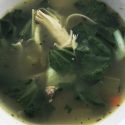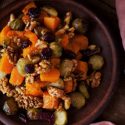What you should know about fat
Did you know that your body needs fat? That’s right! Thanks to the low-fat dieting craze of the ‘80s and ‘90s, many people think fat is “bad” and should be avoided. It’s true that many Americans consume more fat than they need — but it is also possible to consume less than you need for health. I see the latter frequently when I work with clients trying to lose weight.
Did you know these facts about fat?
- Eating fat will not necessarily make you fat. Your body stores excess calories you consume from any source (protein, carbohydrates, fat or alcohol) as fat on your body. So fat gain or loss comes down to calories, not fat grams.
- It is optimal for a healthy person to get about 30 percent of their calories from fat. For an average 2000 calorie diet, that’s about 67 grams of fat per day.
- Your body needs fat to absorb vitamins A, D, E, and K properly.
- Fat has many roles. Your body uses fat to maintain healthy skin and hair, insulate organs to protect against shock, and maintain body temperature.
- Fat improves satiety of foods — in other words, fat tastes good and satisfies you longer.
- There are different kinds of fat in foods we eat. Most foods contain some combination of these fat types:
o Saturated fat is a type of fat that is found in animal products and some plants, like palm kernel oil and coconut. It is a solid a room temperature. Saturated fats have been demonstrated to raise LDL cholesterol (your “bad” cholesterol), when consumed in excess amounts, so it is recommended to limit your intake to 10% or less of your total calories. For a 2000 calorie diet, that’s about 22 grams per day.
o Trans fat is an unsaturated fat that has been chemically modified, through a process called hydrogenation, to be saturated. This tends to increase the shelf life of the product, but at the cost of health. Trans fat increases LDL cholesterol — and the risk for heart disease and other chronic diseases — even more than saturated fat. Avoid trans fat, also called hydrogenated oils, if at all possible. Check out this article on the FDA removing trans fat from our food supply.
o Polyunsaturated fat is found in nuts, seeds, plant-based oils (like soybean oil), and fatty fish like tuna and salmon. These fats have been shown to decrease total cholesterol levels (both LDL and HDL). Omega-3 fatty acids are a type of polyunsaturated fat that can help lower triglycerides and blood pressure, and may help with other conditions like rheumatoid arthritis and depression. Omega-3s are found in fatty fish, flax seed, and some algae.
o Monounsaturated fat is found mainly in olives, avocados, nuts, and vegetable oils like olive oil, canola oil, and peanut oil. Monounsaturated fats can lower LDL cholesterol, while keeping HDL cholesterol (your “good” cholesterol) high.
- Yes, fat is calorie-dense. All types of fat have 9 calories per gram (rather than 4 calories per gram of protein and carbohydrates). So even with all the benefits of fat, you should still practice moderation.
How can you put that information to work for your health? Just remember a few simple tips:
- Don’t cut the fat; change the type!
- Eat more fats from plant and fish sources, and less from land-dwelling animals.
- Use oils that are liquid at room temperature instead of butter or lard.
- Avoid processed snacks like cakes, cookies, and some crackers. These foods are notorious for containing trans fat.
- Keep your diet balanced. Your body needs the right combination of protein, carbohydrates, and fat to function at its best!
If you need help balancing your meal plan, call one of our specially trained health coaches at 1-800-807-0751!
How will you incorporate healthy fat into your diet today?




